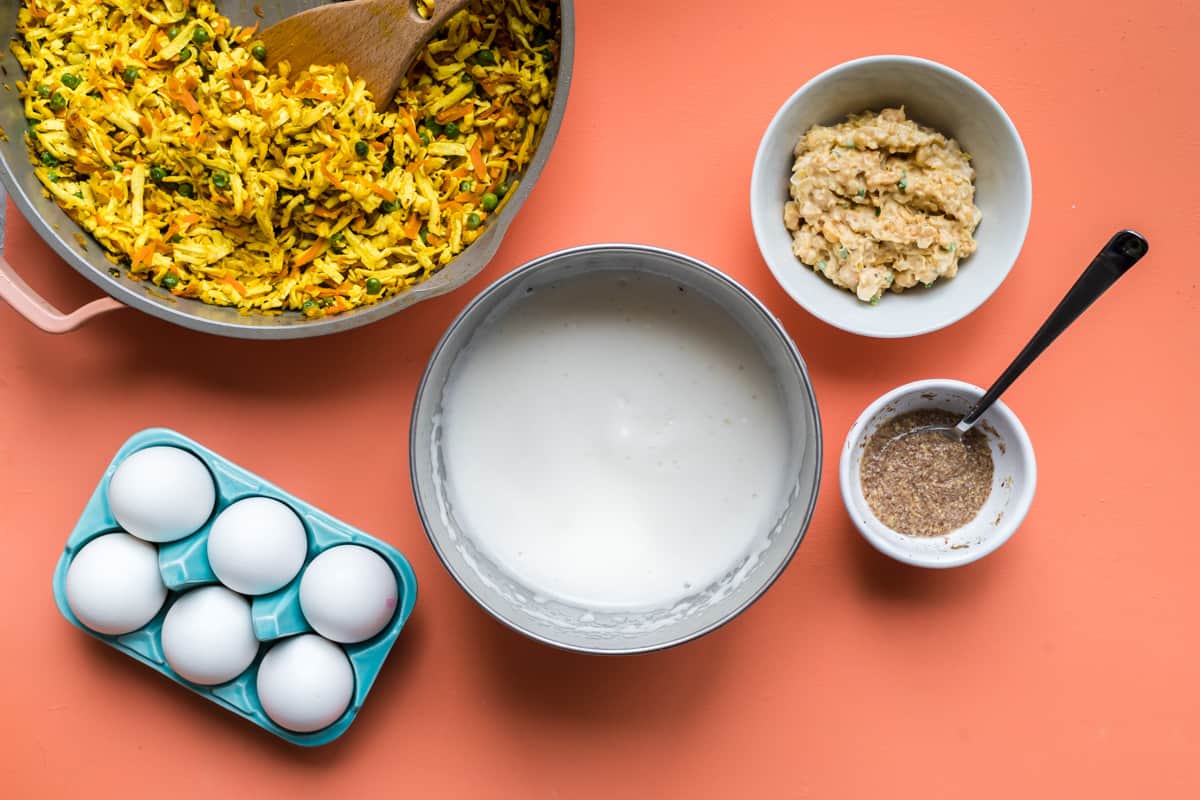Disclaimer: we’d like to disclose that we have had paid partnerships with Manitoba Egg Producers, however this blog post is not sponsored in any way.
If you’ve gotten to know us by now at Happy Healthy Eaters, you might notice, both of us sort of have a thing for eggs. In our homes, eggs are easily considered an almost everyday food. This is mostly because we enjoy them, they are accessible, affordable, easy to prepare for any meal of the day but also, it’s food everyone in our households can tolerate.
So what happens when your baby doesn’t eat eggs? This could be for a variety of reasons. Some families may choose to raise a vegan household, or others may learn their baby has an allergy to eggs.
Then what?
We’d love to help, so this blog post is all about learning what’s in eggs, and what your options are for egg replacements!
Egg Nutrition 101
First, let’s look at what makes eggs so nutritious!
The vast majority of nutrition in an egg is stored in the golden yellow yolk. Trust me, I cringe every time my kids say “mama, mama, no yolk ok!”. Here is where you’ll find things like:
- Iron – very important mineral for a growing baby, helps carry oxygen to cells and prevent anemia
- Vitamin A – helps support healthy eye tissue
- Vitamin D (small amount) – plays a role in bone health and supporting immune health
- Vitamin B12 – helps to support brain development and produce healthy red blood cells
- Folate – helps to produce and maintain new cells
- Lutein – promote optimal eye development and health
- Choline – now being studied for its role in brain development
Now that we’ve dissected most of what you’ll find in the yolk, you might be wondering about the beautiful egg white too. Egg whites contain the majority of the protein found in eggs, which is also a crucial nutrient for building and repairing muscle, organs, skin and other body tissues. You might not know this, but protein is also really important for producing the enzymes we need for the millions of reactions that take place in our body! Protein also helps to produce antibodies and hormones.
We’d like to go on record saying that we didn’t share ALL of the nutrition benefits of eggs here, but, we’ve captured things really well!
Suggested reading: Vitamin D for Babies
But what if my baby is allergic to eggs?
In many cases, parents who are offering their baby human milk may realize early on that their baby has an allergy to egg. Subsequently, nursing parents may need to eliminate eggs from their diet (in many cases, along with other foods such as cow’s milk and/or soy) to continue with a healthy breast/chest feeding relationship. This happens when egg proteins pass through to the human milk and are transferred to the baby.
In other cases, parents may realize their baby has an egg allergy after introducing it once solid foods have been initiated.
Regardless of when the allergy is discovered, you’ll likely need to avoid offering eggs to your baby until further discussion with your healthcare provider or an allergist who can support you.
If that’s you, we’d love to share that in most cases babies will outgrow an egg allergy. And, it’s always our hope that this is the case for you. Sending our allergy parents loads of love and compassion. It. Is. Hard.
What can I offer my baby to replace the nutrients found in eggs?
While eggs offer a variety of important nutrients for babies, thankfully they don’t hold exclusive rights to them! All the nutrients in eggs can easily be found in other foods. Here are several examples (the lists are not exhaustive!) of foods to offer your egg-free baby to match the nutrients found in eggs:
- Protein: meat, lentils, quinoa, tofu, nut butter
- Iron: iron-fortified infant cereal, meat, fish, chickpeas, spinach
- Vitamin A: dairy foods (for older babies), carrots, sweet potatoes, fish, liver (concentrated form of Vitamin A so limited amounts only so as to avoid a toxicity)
- Vitamin D: fortified milk, margarine, salmon, mushrooms, and supplements
- Vitamin B12: dairy foods (for older babies), meat, fish, and supplements (for vegan raised babies)
- Folate: avocados, broccoli, oranges, kale, green peas
- Lutein: spinach, kale, asparagus
- Choline: meat, soybeans, fish, potatoes, wheat germ
- Suggested reading:
- Best Milk for Babies: a Dietitian’s guide to safely introducing baby to milk
- Why Your Baby Needs Omega 3 Fatty Acids
What can I offer my baby to substitute eggs?
Baked Goods (muffins, meatballs, etc)
In addition to being nutritious, eggs are often included in recipes for a unique ability of their proteins. Eggs are liquid when raw but become solid when cooked. As such, they have a great ability to hold ingredients together when cooking or baking!
To replace this binding function, you can use other ingredients that also have the ability to help hold ingredients together. Flax and chia seeds both create a gel when added to water, which can “glue” ingredients together.
To make a “flax egg”, simply stir together 1 tbsp ground flax with 2 ½ tbsp hot water. Allow it to sit for 5 minutes to allow time for the gel to form.
Where to use it: You can use this “flax egg” in baking recipes: muffins, cookies, etc or to help bind together meatballs, fish burgers, kebabs, and other patties.
Watch our instructional video here!

Another convenient egg-replacement product on the market is Bob Red Mill’s Egg Replacer. Where we live, it can be purchased at most grocery stores.
Egg Whites and Meringue
The proteins in egg whites can also be whipped into a light, foamy texture! Interestingly enough, the water from cooked chickpeas can do the same thing! It’s called aquafaba and you can find instructions for how to make it here.
Where to use it: use aquafaba to replace whipped egg whites in baking recipes. The Vegan Society has twenty different ideas for using it! Who knew chickpeas could be so versatile? Do your best to look for no added salt canned chickpeas though!
Artful Parent also has instructions for how to make a fun play foam from aquafaba!

Scrambled Eggs
You may be mourning the loss of making scrambled eggs for a quick and easy meal but don’t worry; we have just the thing for you! Scrambled tofu! And if you’re scrunching your nose up because the idea of tofu doesn’t sound appetizing to you, just remember that your baby has no preconceived notions about tofu and will probably LOVE it!
All you need to do is buy extra-firm tofu, press it to remove the excess moisture, break it up into little pieces, and scramble fry with your favourite herbs and spices!
And if you’re missing omelettes, The Edgy Vegy also has a recipe for using tofu to make an omelette batter! Or, our very own Nita has a recipe for Indian Tofu Sabzi you can totally offer your baby!
Where to use it: make scrambled tofu for a quick and easy breakfast, lunch, or dinner! Serve with toast, roti or even on it’s own.

Egg Salad Sandwich
Chickpeas are a good stand-in for eggs when making a sandwich! Simply smash the chickpeas with a fork slightly, then substitute for eggs in your favourite filling recipe (just remember to skip the salt for baby!). Personally, we love fellow food blogger Oh She Glows and this chickpea filling recipe. Of course, you’ll need to adapt it to be baby friendly and we teach you exactly how to do that in our ecourse, Start Solids Confidently.
Where to use it: spread some filling on strips of toast or skip the bread altogether and just serve the filling to your baby!

Suggested reading: How to Adapt Recipes to be Family Friendly
And there ya have it friends…you now know what to do if your baby is unable to eat egg! As previously mentioned, if you’re struggling with an allergy we really do hope it resolves over time. And if eggs are a part of your family’s diet, there are so many wonderful foods you can offer your baby that are nutritious!






